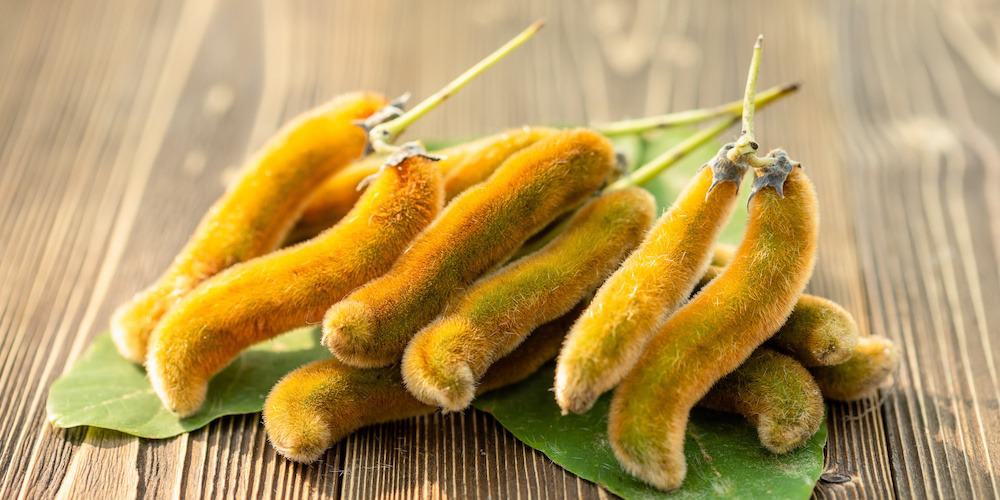BENEFITS OF MUCUNA
✓ Reduces sexual dysfunction
✓ Supports the nervous system
✓ Reduces blood sugar
✓ Increases muscle mass
✓ Antioxidant
What is mucuna?
The mucuna’s scientific name is Mucuna pruriens or Dolichos pruriens. Also called “scratch pea”, “red bean” or “muscat pea”, it belongs to the Fabaceae family just like the common bean, the garden pea, the fava bean or the carob tree.
The genus Mucuna includes more than 80 different species including Mucuna pallida from Réunion Island, Mucuna poggei from Africa, and Mucuna urens from the Americas.
But it is Mucuna pruriens that is most used in phytotherapy and traditional medicine. It is also the one we are interested in here.
Native to the tropical regions, it prefers warm, humid climates. It grows in Asia (India and China), as well as in Africa and South America. It appears as a climbing plant or vine that attaches to the natural supports around it.
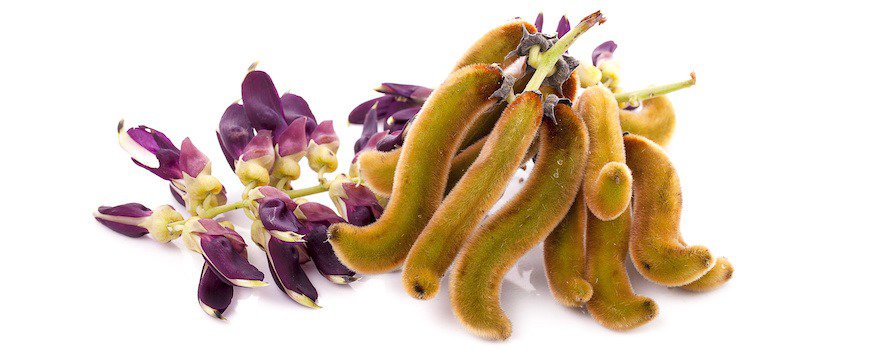
If it benefits from optimal conditions, mucuna can grow very quickly and reach 15 m in height. In some regions, such as Réunion or New Caledonia, it is even considered an invasive species and its introduction there is prohibited.
Its leaves are oval and its white or purple flowers appear from November to January. Arranged in clusters, they have a butterfly shape. But it is above all the pods that make up the most astonishing part.
After flowering, the plant produces pods covered with stinging hairs. Composed of histamine and mucunain, these hairs can cause severe itching at the slightest contact. Each pod contains up to 6 black seeds called « peas ». It is in the pods and in the seeds that the active constituents of mucuna are concentrated.
In Asia and Africa, it is cultivated as a green manure to improve soil fertility and serves as a good source of feed for livestock. In Central and South America, its seeds can be used as a coffee substitute.
Today, mucuna is mainly cultivated for its medicinal properties. It is an important plant in Ayurvedic medicine where it is used for its effects on the reproductive system and the nervous system. It is said to boost libido and may increase fertility, much like maca.
In the West, demand for mucuna is growing, notably thanks to its high content of L-Dopa, the amino acid precursor to dopamine.
Nutritional composition
- 18 acides aminés dont la L-Dopa
- Sérotonine
- Vitamines : B1, B2
- Saponines
- Alcaloïdes : mucunadine, mucunine, prurienidine
- Minéraux et oligo-éléments : potassium, calcium, fer, manganèse, phosphore, zinc, cuivre, magnésium, sodium
- Protéines
- Lipides
- Fibres
- Polyphénols
- Composés phénoliques et tanins
- Autres : acide phytique, trypsine, D-chiro-Inositol
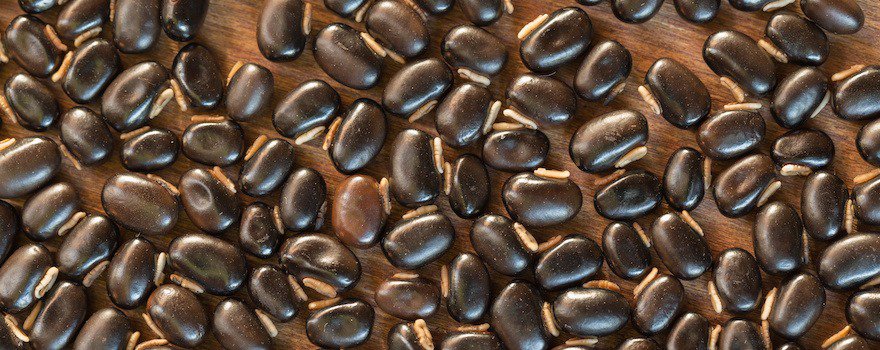
Benefits of mucuna
🔥 Reduces sexual dysfunction
Mucuna is above all known for its action on sexual disorders. In Ayurvedic medicine, the plant is recommended to treat erectile dysfunction, combat impotence, stimulate libido, improve fertility and increase sperm count. In Ayurveda, it helps balance the three doshas (Vata, Pitta, Kapha) or vital energies.
The aphrodisiac action of mucuna is due to the presence of an amino acid called 3,4-dihydroxyphenylalanine or L-Dopa. This molecule, present in large quantities in the seeds, acts effectively to improve sexual function in both men and women.
Once consumed, L-Dopa has the ability to be converted into dopamine, a neurotransmitter responsible for many biological functions including libido. The increase in dopamine levels also influences testosterone levels, the male sex hormone.
This study from King George’s Medical University in India, conducted on men suffering from infertility, shows how mucuna seed powder increased sperm concentration and improved semen quality.
🙏 Supports the nervous system
In Ayurvedic medicine, mucuna is recommended to treat neurological disorders and various diseases of the nervous system. Today, this plant is the subject of extensive research as it could be a potential treatment for Parkinson’s disease.
This chronic, degenerative neurological disease affects the central nervous system and produces many symptoms: tremors and involuntary movements, neuron destruction, cognitive impairments…
The L-Dopa contained in the seeds plays an interesting role in the fight against Parkinson’s disease. It has been proven that a dopamine deficit is directly linked to certain neurological pathologies, including this one. After crossing the blood-brain barrier, the L-Dopa from mucuna increases dopamine levels in the brain. This has the effect of improving most of the symptoms of Parkinson’s disease.
Today, L-Dopa is a standard treatment for Parkinson’s disease, known as « levodopa ». But this antiparkinsonian drug contains synthetic L-Dopa and causes more side effects than the plant we are focusing on here.
As shown by this retrospective of the history of Parkinson’s disease, published by the Rush Unniversity Medical Center in Chicago, the parkinsonian syndrome or “kampavata ” was already treated in India via the administration of powdered mucuna.
This study, published in the Journal of Alternative and Complementary Medicine and conducted on patients with Parkinson’s disease, shows how mucuna powder improved symptoms with few side effects.
🍭 Lowers blood sugar
Mucuna has a hypoglycemic effect, that is, it lowers blood sugar levels. That is why it is used in Ayurvedic medicine to fight diabetes. This action is explained by the presence of B vitamins, valuable in the treatment of type 1 and type 2 diabetes.
Indeed, vitamin B1 (thiamine) and vitamin B2 (riboflavin) contained in mucuna are involved in carbohydrate metabolism and participate in the conversion of sugars. In addition, they prevent many diabetes-related complications such as an increase in “bad” cholesterol and triglycerides.
Its hypoglycemic action is also due to D-chiro-inositol present in the seeds. This natural compound has an insulin-mimetic effect and is therefore effective against insulin resistance.
This study of the University of Siena, conducted on patients with diabetes, demonstrates the anti-diabetic effects of mucuna seeds.
🏋🏻♀️ Increases muscle mass
Mucuna is an interesting plant for athletes who want to gain muscle mass. Indeed, by increasing dopamine, it also affects testosterone levels because dopamine and testosterone are closely linked.
Testosterone is a hormone involved in the development of muscle mass, in the growth of muscle tissue and fibers. Testosterone also improves exercise endurance and recovery by promoting muscle relaxation.
The minerals and trace elements of this plant also contribute to gaining mass and to improving performance. Iron, for example, promotes oxygenation of the muscles while potassium reduces muscle contractions and cramps.
This study from Baylor University, conducted on men undergoing intensive training, explains the relationship between mucuna-induced increases in dopamine and testosterone levels.
🥝 Antioxidant
In addition to L-Dopa, which has antioxidant properties, mucuna also contains polyphenols (phenols and tannins) that trap and destroy free radicals. The plant is particularly useful for reducing oxidative stress and its symptoms.
This study from the University of Calcutta, conducted on in vitro models, shows how mucuna seed extract effectively eliminated free radicals.

How to consume mucuna?
Mucuna tablets
Mucuna tablets or capsules contain the seed powder extract of the plant. It’s a form of dietary supplement that can be easily found in health food stores and specialty shops or online. This format is also a good way to avoid the rather bitter taste of the powder.
Capsules should be sufficiently standardized in L-Dopa (minimum 50%) to expect results.
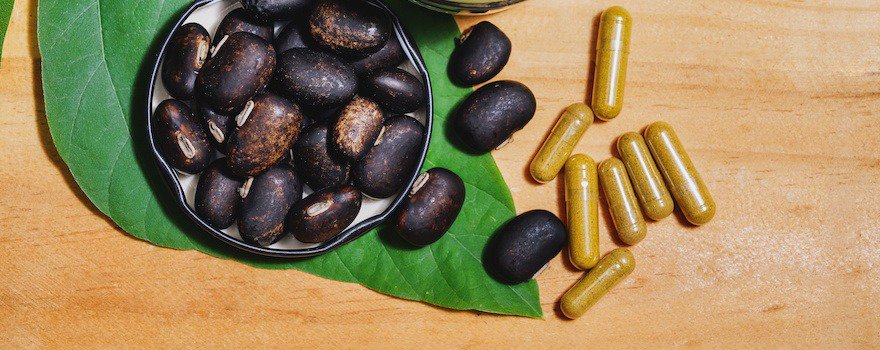
Mucuna powder
Mucuna is also available in powder form. After harvest, the seeds are cold-dried and then ground into powder.
It mixes easily into a drink (water, fruit juice, smoothie…) but its taste may not appeal to everyone. Again, check its L-Dopa content.
Why choose organic mucuna?
Mucuna is a plant that tends to absorb pollutants, pesticides and heavy metals. That’s why one should prefer mucuna cultivated organically.
The organic label guarantees capsules free from chemical residues and not irradiated. Also choose capsules with no additives and no preservatives.
Mucuna and tribulus
Mucuna pairs well with Tribulus (Tribulus Terrestris), another Ayurvedic plant. The mucuna/tribulus combination can be useful for improving libido and sexual performance.
You can also combine mucuna with turmeric (Curcuma longa) or with spirulina (Arthrospira platensis) to boost the body or as part of an exercise routine.
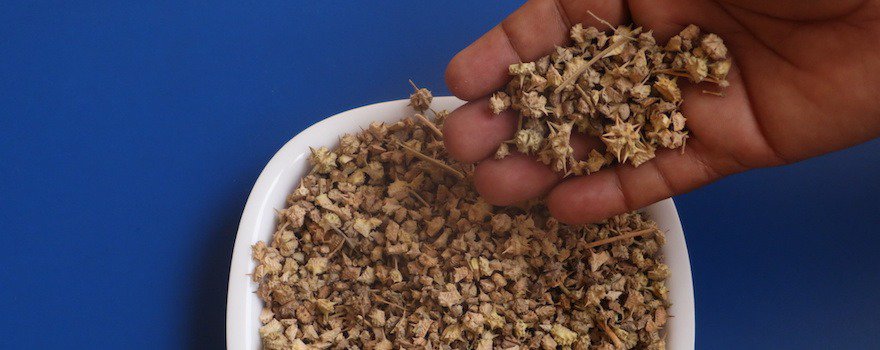
Mucuna dosage
⚖️ The recommended dosage can be up to 900 mg per day. Since mucuna is a relatively potent plant, start with small doses. Depending on how your body reacts, increase the dose gradually.
⏳ Doses should be taken twice a day, preferably in the morning and in the evening. When consumed at breakfast, mucuna provides energy and improves concentration. When taken in the evening, it reduces stress and helps with falling asleep.
⏳ Mucuna can be taken as maintenance, daily, or as a 1- to 3-month course. Each course should be followed by a 2-week break.
💊 Tablets: up to 3 per day for 300 mg capsules.
🥄 Powder : 1/2 to 2 teaspoons per day.
Contraindications and side effects
Consumption of mucuna has certain contraindications. Therefore, the plant is not recommended for the following people :
- Par mesure de précaution, les jeunes enfants, les femmes enceintes ou allaitantes doivent éviter de prendre du mucuna.
- On le déconseille aux personnes souffrant de maladies cardio-vasculaires, de troubles psychiatriques, de troubles hépatiques et de cancers évolutifs.
- Les personnes diabétiques ou sous traitement médicamenteux doivent demander conseil à leur médecin avant d’en consommer.
Side effects, most often mild, may occur after consuming mucuna. Nausea, headaches, and gastrointestinal issues may arise. If symptoms persist, stop taking it and consult a doctor.
History, cultivation, and market of mucuna
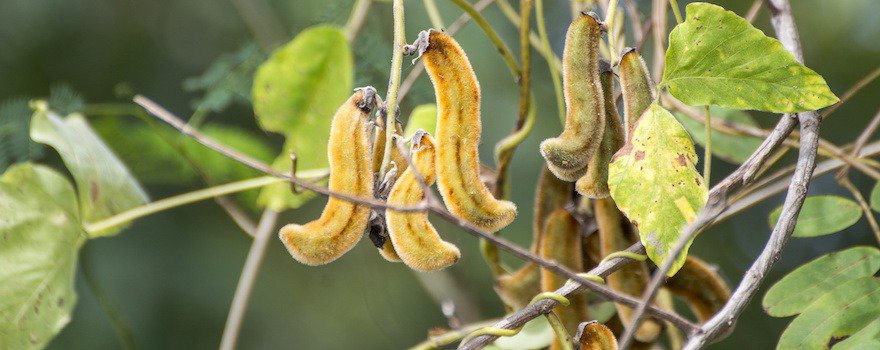
Because of its high protein content (up to 35%) and its high digestibility, mucuna is an interesting food for human consumption. Very nutritious, it is still widely consumed by rural populations in Asia, the Americas and Africa, who find many nutrients in it.
It is cultivated and cooked as a leafy vegetable. Once boiled, the seeds are also used for the preparation of a flour that will be used to feed animals. In Africa, the mucuna flour is an interesting substitute for some more expensive raw materials for poultry farmers. In Burkina Faso, it is increasingly used for the feeding of domestic ruminants.
In Guatemala, its seeds (nicknamed “Nescafé”) are a good substitute for coffee beans, without the stimulating effects.
Finally, it is used as a green manure because of its ability to fix nitrogen, to protect the soil and to slow the development of weeds.
Report compiled by Julia Perez and Charlotte Jean
Sources and scientific studies
Kamla Kant Shukla, Abbas Ali Mahdi, Mohammad Kaleem Ahmad, Shyam Pyari Jaiswar, Satya Narain Shankwar, and Sarvada Chandra Tiwari, 2007. Mucuna pruriens Reduces Stress and Improves the Quality of Semen in Infertile Men.
Christopher G. Goetz, 2010 The History of Parkinson’s Disease: Early Clinical Descriptions and Neurological Therapies.
Journal of Alternative and Complementary Medicine, 1995. An alternative medicine treatment for Parkinson’s disease: results of a multicenter clinical trial. HP-200 in Parkinson’s Disease Study Group.
Lucia Raffaella Lampariello, Alessio Cortelazzo, Roberto Guerranti, Claudia Sticozzi, and Giuseppe Valacchi, 2012. The Magic Velvet Bean of Mucuna pruriens.
Biswas S, Mallick U.K, Mukherjee A, Ghosh.G, 2010. Antioxidant activity of Mucuna pruriens seeds, cultured callus and L-Dopa.


